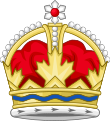Member of Parliament (Canada)
 Members of Parliament debate in the Centre Block in Ottawa, 2018 | |
| Occupation | |
|---|---|
Occupation type | Politician |
Activity sectors |
|
| Description | |
| Competencies |
|
Related jobs | |
 |
|---|
Member of Parliament (post-nominal letters: MP; French: député, [depyte]) is a term used to describe an elected politician in the House of Commons of Canada, the lower house of the Parliament of Canada.
Terminology
[edit]The term's primary use is in reference to the elected members of the House of Commons. In legislation, it can also refer to the unelected members of the Senate of Canada, but in common usage, the title senator (French: sénateur (masculine), sénatrice (feminine)) is typically used. By contrast, no such alternate title exists for members of the House of Commons. A less ambiguous term for members of both chambers is parliamentarian.[1]
There are 338 elected MPs, who each represent an individual electoral district, known as a riding. MPs are elected using the first-past-the-post system in a general election or byelection, usually held every four years or less. The 105 members of the Senate are appointed by the Crown on the advice of the prime minister.
Representation
[edit]As of May 2024, the number of members was increased to 343. One riding in Ontario, three in Alberta and one seat in British Columbia. These seats will remain vacant until the next federal election. Prior to May 2024, the House of Commons had 338 members, each of whom represents a single riding. Seats are distributed among the provinces in proportion to population, as determined by each decennial census, subject to the following exceptions made by the Constitution of Canada. Firstly, the "Senate floor" guarantees that each province will have at least as many elected MPs as senators.[2] Secondly, the "grandfather clause" guarantees each province has at least as many seats now as it had allocated in the 1985 Representation Act.[2]
Oath and affirmation
[edit]The oath for members of Parliament has stood the same since confederation; according to Section IX.128 of the Constitution Act, 1867: "Every member of the Senate and the House of Commons of Canada shall before taking his Seat therein take and subscribe before the Governor General or some Person authorized by him, and every Member of a Legislative Council or Legislative Assembly of any Province shall before the Lieutenant Governor of the Province or some Person authorized by him, the Oath of Allegiance contained in the Fifth Schedule to the Act."[3] The oath set out in said schedule is: I, [name], do swear, that I will be faithful and bear true Allegiance to Her Majesty Queen Victoria, with the further instruction that "the name of the King or Queen of the United Kingdom of Great Britain and Ireland for the Time being is to be substituted from Time to Time, with Proper Terms of Reference thereto." The oath reads as follows:
I, [name], do swear, that I will be faithful and bear true allegiance to His Majesty King Charles III.[4]
Or in French:
Je, [nom], jure que je serai fidèle et porterai une vraie allégeance à Sa Majesté le Roi Charles III.[5]
For those parliamentarians whose religion prohibits the swearing of oaths, there exists a compromise affirmation, first instituted in 1905:
I, [name], do solemnly, sincerely and truly affirm and declare the taking of an oath is according to my religious belief unlawful, and I do also solemnly, sincerely and truly affirm and declare that I will be faithful and bear true allegiance to His Majesty King Charles III.[6]
Number of members
[edit]181 MPs were elected during the 1867 Canadian federal election.
308 MPs were elected during the 2011 Canadian federal election.
338 MPs were elected during the 2021 Canadian federal election.
343 MPs will be elected during the 45th Canadian federal election.
Privileges
[edit]Parliamentarians enjoy parliamentary privilege, as derived from common law.[7]
Remuneration
[edit]In 2024, the annual salary of each MP was CA$203,100. Members may receive additional sums by virtue of other positions or functions they hold, such as that of Prime Minister, Speaker of the House or a Minister of the Crown.[8]
See also
[edit]References
[edit]- ^ Government of Canada, Department of Justice (December 2, 1999). "Legistics - Members of Parliament". www.justice.gc.ca. Retrieved January 25, 2023.
- ^ a b Qualter, Terence H. and John M. Wilson (September 18, 2015). "Redistribution of Federal Electoral Districts | The Canadian Encyclopedia". www.thecanadianencyclopedia.ca. Retrieved May 31, 2021.
- ^ Victoria (July 1, 1867), Constitution Act, 1867, IX.128, Westminster: Parliament of the United Kingdom, retrieved April 1, 2009
- ^ Victoria 1867, Fifth Schedule
- ^ le Clère, René (Summer 2003), "Serment d'allégeance à la Reine dénaturé par des députés souverainistes du Québec!" (PDF), Canadian Monarchist News, 7 (4), Toronto: Monarchist League of Canada, archived from the original (PDF) on July 8, 2009, retrieved January 13, 2009
- ^ Marleau, Robert; Montpetit, Camille (2000), House of Commons Procedure and Practice, Ottawa: Queen's Printer for Canada, p. 176
- ^ Shaw, McCarthy Tétrault LLP-Byron; Goldenberg, Adam; Azimov, Rauf (October 6, 2020). "Court of Appeal for Ontario rules that parliamentary privilege prevents Mike Duffy from suing the Senate | Lexology". www.lexology.com. Retrieved February 27, 2021.
- ^ "Indemnities, Salaries and Allowances". lop.parl.ca. Retrieved September 3, 2022.
External links
[edit]- List of current House of Commons members Archived December 13, 2019, at the Wayback Machine
